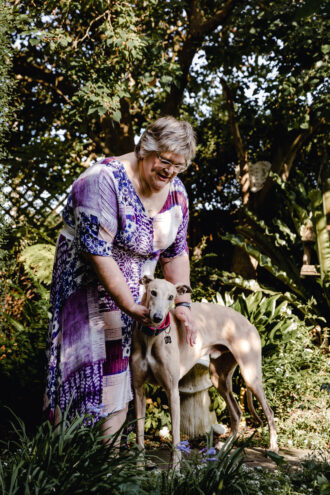
When I first adopted Dreamy five years ago, he was a different greyhound. I don’t know what he had experienced, but it influenced his life. He was an agitated and anxious boy.
Within the first half hour of coming home he had jumped on my bed, peed on the ottoman, peed on my rose bush, and drunk from the fishpond. While I was at work, I locked him outside with access to the laundry. He pulled bags from the top of the cupboard and ripped them apart, ripped up three beds, left footprints on the walls and above the doorway, chewed the door frames, pulled a power point out of the wall, ripped the outside awning and the rubber between the sliding doors.
When I got home at night, I was afraid to open the laundry door for fear of what I would find. He was so agitated that I had to calm him before entering the house. The neighbours complained because he howled like a wolf during the day.
Then, I gave him access to the house so he could feel nearer to me. I covered the furniture with rugs to protect it before leaving for work. A friend offered to take care of him in his home for two half days a week, and I installed a camera so I could check on him when he was alone while I worked. He still suffers from separation anxiety, fear of confined spaces and flies. So, I leave a towel under my leather chairs to pick up the mess, and my friend bought me a carpet spot cleaner.
Why have I persisted? Because someone persisted with me. Just like Dreamy is not a bad dog, I was not a bad person. Dreamy was responding to trauma just like I did in my early years. We assume that unfavourable behaviour reflects a calculated and deliberate intention to harm, but I don’t see it this way. We do not know the details of another’s life so we cannot judge.
Some trauma does not go away. At times when we are triggered, we must love ourselves through the trauma rather than expecting perfection.
I love Dreamy and I know he loves me. He is now a calm, loving and gentle boy. It has been worth the effort, and I wouldn’t change a thing.
In love, Jenny